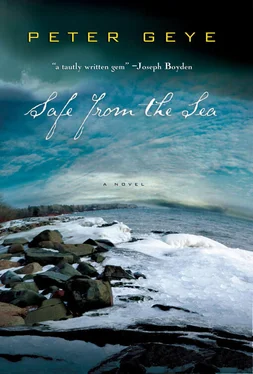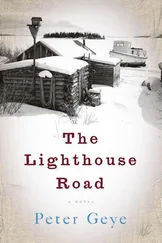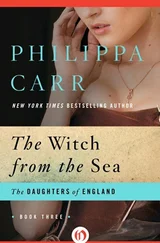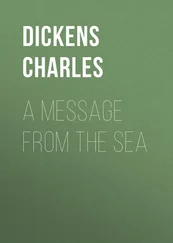“I don’t need a drink.”
“Didn’t say you did. We’ll call it old time’s sake.”
Noah looked at his watch, thought of many reasons not to have a drink with the old man, and pulled up to have the valet park the car.
In the bar Olaf ordered twelve-year-old bourbon from the top shelf. Noah asked for beer, trying to estimate the number of cocktails the old man had put down. It didn’t seem possible a man could drink so much and still be coherent. The drinks arrived, and Olaf twirled his slowly. Tea candles flickered in small bowls of water beside ramekins of cashews on the mahogany bar. Through the curtained windows they looked onto a harbor with sailboats still in their slips.
“Natalie’s a nice gal,” Olaf said. “How she came out of that brood I can’t imagine.”
“I told you they’re decent people.”
“That is what you said.”
A piano concerto that both men knew filtered through the faint conversations taking place around them. Occasionally Noah could hear the halyard lines ringing on the masts of the boats in the harbor. Olaf finished the last of his drink and signaled for another.
After it arrived Olaf said, “Marriage, it humiliates a man.”
“What?” Noah said. He had not been expecting this.
“Makes a man less of what he is.”
Noah shook his head in complete awe of the old man’s audacity. He looked at the jigger of bourbon set before his father and said, “It’s not marriage that makes him less of what he is.”
“I’ve got firsthand proof, boy. I know what a lifetime of marriage can do to a man.”
“What do you know about a lifetime of anything but coming and going, huh? You were always gone. I’m really supposed to sit here and listen to life lessons from you?”
“I’m doing you the favor my old man should’ve done me.”
Noah faced him. “Do you have any idea what you’re saying? Can you not see how insulting this is? To Mom. To me. To Natalie.”
“I don’t mean to insult anyone.”
The calm in his father’s voice only made Noah more upset. “What bullshit. It’s exactly what you mean to do.”
Olaf didn’t waver. “Someday you’ll—”
“For god’s sake, spare me the rest of the lesson. I won’t hear it,” Noah interrupted.
“You will hear it, goddamnit,” Olaf boomed, loud enough that people turned to look. “Marriage dogs a man his whole life. Your mother dogged me. Natalie will dog you. Mark it down.”
Noah took a minute to memorize his disdain. When it was burned in his mind, he dropped a twenty-dollar bill on the bar and stood to face his father. “What happened to you?” he said. He wanted to continue, but his loss of words overwhelmed him, and he left without saying another.
The next afternoon Olaf showed up in his rented tuxedo. He had trimmed his beard and combed his rim of white hair. He sat there easily during the ceremony, kissed Natalie on the cheek while they danced at the reception, even offered Noah a wink from across the ballroom.
That had been the last time they’d seen each other.
OLAF WAS SITTING in the great room with a cup of coffee when Noah woke the next morning. Noah was still smarting from their talk on the beach the night before, but he said good-morning and poured himself a cup and sat down.
Without pleasantries Olaf said, “You mind running into town for me?”
“Not at all.”
“I need a length of chain. Forty feet. Polyurethane coated. Go to the hardware store. Knut will help you.”
“I’ll go after this.” He held up the coffee. “You mind if I take your truck?” Noah wanted to see what it felt like to be behind the wheel of that thing.
“The keys are hanging by the door.”
“Anything else you need?”
Olaf shook his head. An awkward moment passed while Noah sipped his coffee. Before it was a quarter gone, he got up to leave.
By the time he got to Misquah he’d made a short list of things to do himself, and as he dialed his sister’s number on the pay phone outside the Landing, snow flurries began to blow across the parking lot. Solveig answered on the first ring, singing hello and asking how he was. They exchanged pleasantries, but the conversation became as dismal as the weather the moment he announced his whereabouts. She had managed, through her own adult years and despite the fact that her childhood had been just as fatherless as Noah’s, to forgive the old man most of his disgraces. Perhaps this was because Noah had borne most of Olaf’s brutishness. Solveig still dutifully visited the old man each Christmas, still invited him to her summer home each Fourth of July. Though Noah had never understood her devotion, he was glad for it.
She of course knew that only extraordinary circumstances would have brought Noah to Misquah, so she asked plainly what he was doing there. Noah filled her in, sparing no detail. When he neared the end of his recounting, he told her how feeble and sickly their father appeared. It was as if Noah had forgotten his audience altogether.
Solveig paused before commencing her litany of questions and concerns: She begged for clarification, asked Noah to repeat his story and elaborate on what he meant by sickly and feeble, instructed Noah on their father’s habits and proclivities, spit out her husband’s trial docket — he was an attorney in Fargo, where they lived — and her kids’ hectic schedules. Noah could practically hear the machinations of her distraught mind. Finally she told Noah she would get there as soon as possible, though she admitted she had no idea when that would be.
It was only after he had hung up that Noah realized he hoped her arrival would be delayed, realized that he wanted some time alone with the old man, come what may.
THERE WAS AN agate and smoked-fish shop on the northern edge of town. He’d seen it on the day before. When he walked in, a synthesized loon call startled him from above the door. On the left a refrigerated deli case — an antique thing that hummed and clinked and dripped — was filled with smoked fish. There were sockeye salmon, ciscoes, lake and rainbow trout, whitefish and smelt, all whole, all golden, desiccated, and eyeless. On the right another glass case full of agate jewelry sat under canned lights. A counter spanned the two cases, and an antique cash register sat in the middle of it.
“How do?” a man said from behind the fish counter. Thin and long-fingered, he offered his hand. The two sides of his gray goatee were unevenly trimmed. “Rocks or fish?” he said as Noah shook his hand.
“Agates,” Noah said. “I’m looking for something for my wife.”
“Normally it’s my own wife who handles the rocks, but she’s visiting our daughter out in Portland.” He wiped his hands on a dirty apron as he circled behind the counter to the agate case. “I can help you, though. What’re you looking for? A nice necklace? Maybe a bracelet?”
The only piece of jewelry he’d ever bought Natalie was the half-carat diamond ring he’d given her when he proposed. “A necklace maybe. Something simple, not too gaudy.”
“What color eyes has she got?”
“Green-gray.”
“You like the green or the gray better?”
“The green, I guess.”
“Then you want a green agate.” He fumbled with the latch on the case. There were hundreds of pieces of agate jewelry on display, arranged without any regard for appearances. Gold-and silver-chained bracelets and necklaces lay heaped and tangled together, earrings and rings were dumped in ceramic bowls. There was even a tiara on a Styrofoam bust.
The first couple of necklaces he pulled out of the case had agates the size of Ping-Pong balls attached to thick gold chains. Noah asked if he had anything with a smaller agate, something on a silver chain perhaps. As he said it the absurdity of buying her an agate hit him. Just as he thought it, though, the man behind the counter pulled out a pearl-sized, emerald-green agate attached to a very thin, very pretty silver chain. “This one’s actually a real Superior agate,” he said, putting on a pair of glasses and reading from the little tag. “An Agate Beach agate. Not all of them are.” He winked.
Читать дальше












